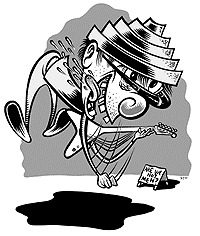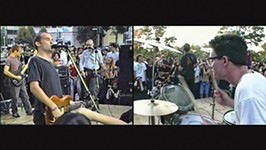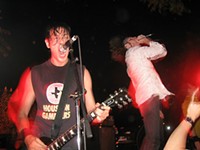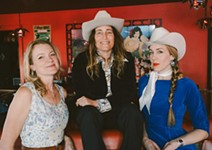Sloppy, Glorious, and Completely Indigenous
Austin's Hoot Night Tradition
By Tim Stegall, Fri., Jan. 17, 1997
 illustration by Roy Tompkins |
Many "experts" are wrong. Need evidence? Next time you phone or write a friend in New York, Chicago, Seattle -- wherever -- just ask 'em the last time they attended a Hoot Night. You're virtually guaranteed an instant, "What the hell is that?!" Kinda like Shiner and decent barbecue or Mexican food, the Hoot Night -- that glorious, sloppy tradition in which a bunch of musicians gather to play anyone's music but their own -- is completely indigenous. And to think it all began with a pilfered sleeve note:
"`Hootenanny' is to folk music what `jam session' is to jazz, namely a gathering together of all sorts of people -- celebrated performers, amateur singers and pickers, and sing-along, hand-clapping devotees. The meeting ground is simply a vigorous love for folk music.
"The Hootenanny was a necessary invention of the late 1930s: The `Hoot' was a completely spontaneous, unrestrained event, and consequently produced many of American's greatest folk artists and songs.
"Today, folk music is practically in the Big Business category and the word `Hootenanny' has even made Webster's. Accordingly, Hoots are liable to take place anywhere -- the basement, a nite club, or the Modesto after a concert -- and now on a record. Luckily for all of us folkniks, the essence of the old Hootenanny -- its immediacy, variety and incredible excitement -- still remains."
Most people know those words from a 14-year-old Replacements album, Hootenanny. Very obviously cribbed from some early, Sixties-vintage, 10-cent folksploitation album one Replacement or another had stumbled across at some long-forgotten garage sale, thrift store, or whatnot, those words nevertheless planted a germ in the mind of Michael Hall.
Talk to virtually any insider of the day and they'll uniformly point their finger at Hall and insist he was the Father of the Hoot Night. Brent Grulke, then Hall's roommate, vaguely recalls Hall poring over those Hootenanny liner notes, stroking his chin, and letting out a fairly classic noise: "Hmmmm...." That "hmmm" apparently couldn't have happened at a better time.
"They came at the time when I had left the True Believers," says Alejandro Escovedo, who claims the early Hoots were partly responsible for getting him back into playing music. And he wasn't the only local musician who felt adrift: "A lotta things had changed at that point," he explains. "The Beach was no longer. That Austin Beach scene, all those bands like Zeitgeist and the Wild Seeds and Doctor's Mob had all kinda broken up and moved on. So there was this void there. I think it was Mike Hall and some other people that started having Hoot Nights. It was just a cool way to kinda while away the evening."
The first Hoots appear to have been organized at the Continental Club, at a time when the South Congress venue still left its doors open to underground talent. Once the Continental closed, however -- later reopening as a more roots-oriented operation -- the Hoots switched location to Big Mamou, then to the Cannibal Club. Originally, the gatherings were more of a literal hootenanny in the traditional sense: A loosely-structured event where you showed up with your acoustic guitar or whatever kind of axe you chose to pluck, strike, or blow, added your name to the sign-up sheet, then waited your turn to take the stage. As producer/musical-man-of-all-seasons Spot puts it, the original Hoots swung the focus away from singer-songwriters and more towards musicians inclined to pick up a Fender Strat. "It was a chance for the electric musician community to find a new mode of expression, one that was more acoustic-oriented."
"The early ones were a helluvalotta fun," chuckles Spot. Having hosted a number of the Tuesday night Cannibal Club Hoots, the local punk rock legend has some vivid memories of the backstage scenes being even more interesting than whatever was unwinding onstage, as two or three people would jam on shared bits of repertoire in the alley behind the club: "Oh, do you know this tune?" "Yeah! Cool!" "Hmm... why don't we go sign up?" Sometimes bands would even be formed out of this experience: One precursor to the Bad Livers, the Barnburners, arose from future Liver Danny Barnes showing up to one Hoot with his banjo and locking horns with local musical mainstays Rich Brotherton and J.D. Foster on a few bluegrass tunes in one such backstage scene. Spot laughs that Barnes claims the Barnburners "must've played 20 gigs after that first Hoot before they ever organized a practice!"
Escovedo was similarly lackadaisical in his preparations for Hoot Nights. "We would try to learn the songs that day or something. I remember we had a practice here at my house and did a version of Al Green's `Take Me to the River.' I think I played it with guitar, synthesizer, and violin or something. It was pretty strange." (Escovedo also recalls a few of his now-standard originals germinating from spontaneous Hoot Night jams, including "Gravity/Falling Down Again.")
The Hoot Night became so popular, in fact, that local radio personality Jody Denberg began organizing Radio Hoots as a deejay on FM powerhouse KLBJ. Rather than following the usual rules, though, Denberg would book the participants ahead of time, basically making the exercise a reason to group together Austin musical luminaries such as Joe Ely, Timbuk 3, and Escovedo on the air.
Innovator Michael Hall then set another precedent when he organized the first Hoot-with-a-theme, this one being an all train songs affair. Soon, theme Hoots ruled the game, either as topical ones (ala the Train Songs Hoot, or the Seventies Hard Rock Hoot, with lovingly sloppy renditions of your favorite Z-28-and-a-hash-pipe classics performed by the locals) or in salute to bands both classic (Led Zeppelin, Ramones, etc.) or dubious ("Yeah, there was probably an Archies Hoot Night," sneers Escovedo). Spot feels said development may have killed the original Hoot Night spirit -- "or, at least made things less interesting."
It wasn't long before acoustic guitars had to make room for full-on electric bands, being either established ones or ad-hoc outfits assembled for the occasion. Long-lived garage pop darlings Pork actually made their debut at a Hoot Night, with Spot playing a minimalist drumkit consisting of pieces which had once done time in the original kits used by the earliest line-ups of Black Flag and Redd Kross.
Brent Grulke recalls the one-night outfit he assembled for a Drug Songs Hoot at the Cannibal Club called Mighty Dope Rig, consisting of Grulke and several once-and-future members of the Wannabes and Sincola, among others. Future Sincola guitarist Greg Wilson apparently had just purchased a beautiful blonde Telecaster, on which he scrawled the word "Dope" just for the occasion. Grulke smirks that Wilson resultingly "became a dope" when he realized the marker he'd used to decorate the guitar was indelible, making the "Dope" designation a permanent one.
Meantime, Mighty Dope Rig's sole goal was to walk on and play Neil Young's "Cinnamon Girl" ("which isn't even a dope song!") at quarter-speed with as much volume as the band could muster. Cannibal owner Brad First's expression dissolved into one of complete horror behind the mixing desk once he realized there was no way his P.A. could compete with the onstage decibels. "There was an audience," Grulke adds with some pride, "until we started playing."
Like any other good thing, the Hoot Night succumbed to old age and eventual death, or at least suspended animation. "It eventually became a rote exercise by the end," agrees Grulke: "It became like the box-set phenomenon. Once you've run out of the good bands, soon enough even the bad bands get box sets. Well, they also got Hoot Nights." Indeed, it's hard to sink any lower than "Jesus Christ Superhoot," a full-blown production of the infamous rock opera organized by Glass Eye's Kathy McCarty and cast with local rock scene luminaries. By all reports, it was a very good production. But Andrew Lloyd Weber?!!!
"I can't remember what my role was," laughs Escovedo. "I think it was as one of the Three Kings -- that was Gretchen Phillips, Steve Chaney and myself. I couldn't remember my words to save my life, and of course the bottle of Jack Daniels we had backstage didn't help! I didn't really know how to prepare for this part. I'd never even seen Jesus Christ Superstar, y'know? It was just one of those things I always thought was kinda lame.
"I can't remember the guy's name -- he used to be the bass player in the Wild Seeds -- but he played Jesus and he was amazing. He was like an opera singer or something. So, he was into it, and there were all these other people like Kathy McCarty and all these people who had their thing down. And of course, I came out with, like, a leather jacket, tight jeans, cowboy boots, no shirt and lots of eyeliner. That was my contribution to the musical. I flubbed my lines -- I think somebody had to sing them for me, maybe it was Steve Chaney."
Escovedo laughs. "It was pretty hilarious."
Once the Cannibal Club closed, Hoots would occasionally be staged at the Hole in the Wall. One of the last Michael Hall-hosted ones was the "Cross-Dressing Hoot," which saw many grown men who probably know better giving in to a long-buried Uncle Miltie fetish. The past year or two has even seen a mutant rebirth of the Hoot Night: It's now a rare special event, always along a theme, with bands pre-booked and arranged in a preset order and playing on shared equipment, the proceeds usually going toward some worthy cause or other.
When a former member of my band the Hormones and the Cryin' Out Louds, guitarist Tim Hayes, sustained hand injuries that resulted in hefty medical bills upon his relocation to his native Seattle, a Devo hoot night was organized in his benefit. The evening succeeded beyond anyone's expectations, capped with appearances by touring Devo-tees Clawhammer and the Oblivians, and raised several hundred dollars for Hayes' wounded hand (and bank balance). According to Hole in the Wall booker Debbie Rombach, it was also the second most successful evening in the club's history. That Hoot was even further outstripped by last month's Ramones Hoot, which raised over $800 for Blue Santa and saw every permutation of the Ramones aesthetic, from Lounge Ramones (Ms. Xanna Don't with a member of King Cheese) to Junior Brown Ramones (Spot, of course) to Transgender Ramones (Handful).
As Spot and Escovedo both bemoan, the original spontaneity of the Hoot Night is gone, but Michael Hall's idea still exists. It's just warped worse than that Yes record you threw in Mom's oven. Not a bad thing, just a different thing, and one completely unique to this area. (Escovedo thinks Hall may have tried to import the idea with him when he migrated to Chicago, but doesn't know how it went over.) All this from a tongue-in-cheek punk rock record sleeve? Hey, as Spot puts it, "Why plan something when a bad idea can accomplish so much more?"
[Portions of this article originally appeared, in a different form, in Slant magazine, available through Urban Outfitters.]








